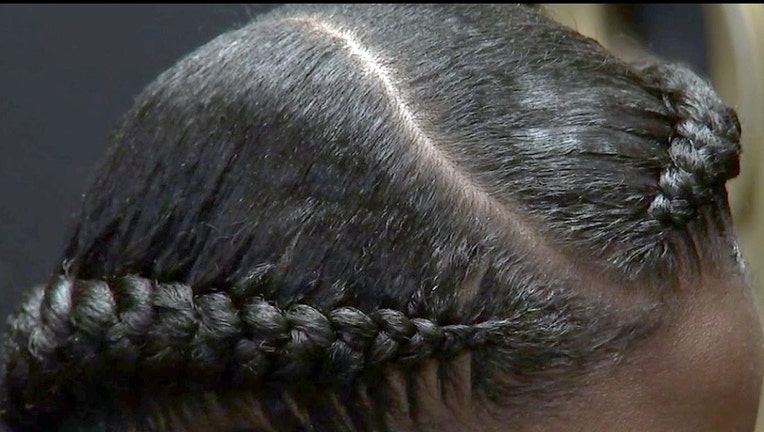Texas House passes CROWN Act, which would ban hairstyle discrimination

AUSTIN, Texas - The Texas House overwhelmingly passed a bill Thursday that would prohibit race-based hair discrimination in schools, workplaces and housing. The lower chamber’s vote took the state one step closer to adopting a law inspired by the experiences of two Black high schoolers near Houston threatened with discipline in the 2019-20 school year if they didn’t cut their locks.
House Bill 567, filed by state Rep. Rhetta Bowers, D-Garland, was voted out of a House committee in late March. An identical Senate bill from state Sen. Borris Miles, D-Houston, is sitting in the Senate State Affairs Committee but hasn’t yet received a hearing. Representatives approved the bill with a 143-5 vote.
"I believe how the hair naturally grows out of our heads should have nothing to do with what is inside," Bowers told the House committee. "And therefore with any of the success that we accomplish, the time is now for Texas to take up this civil rights legislation and protect the people from racial discrimination."
READ MORE: Expanded access to medical marijuana gains traction as Texas House passes bill
HB 567 would add to the state’s education, labor and property codes a prohibition on discrimination based on certain hairstyles — including braids, dreadlocks and twists. Versions of the legislation, called the CROWN Act — an acronym for Create a Respectful and Open World for Natural Hair — have been adopted throughout the country since 2019, when school administrators ordered two young men in Mont Belvieu, about 30 miles east of Houston, to cut their hair.
The bill so far has received what appears to be wide support on its journey through the legislative process — at least in the House.
More than a dozen people spoke in favor of the proposal during a House State Affairs Committee hearing last month. Additionally, more than 70 people registered their support for the measure but did not testify; two individuals registered their opposition, according to a witness list.
Dakari Davis, a Black police officer who testified in support of the bill, said people shouldn’t be reprimanded for sporting styles that are natural for their hair or specific to certain cultures.
Davis, who has cornrows, said he was suspended from duty and prevented from engaging with the community he protected for almost a year before being cleared of violating department policy with his hair.
READ MORE: Texas House committee discusses border bills
"The discrimination had already occurred and the damage was done," Davis said. "I was confused as to how my natural hair determined that I was not good enough to protect Texans, confused as to why I had to change my appearance to fit in with old standards of beauty created during a time where people that didn’t look like me or people that did look like me were considered a non-factor."
He recounted the July 2016 police shootings in Dallas when a gunman killed five law enforcement officials, including one who was Davis’ close friend.
"I remember that night seeing police from all over the state respond to protect Texas, running towards gunfire," Davis testified. "Today as I reflect on that night, I do not recall anyone stopping to say, ‘Hey, I don’t believe that officer’s hair is professional.’"
READ MORE: Hundreds show up to speak at Texas House hearing over school voucher bill
Anecdotal accounts of discrimination like Davis’ have emerged sporadically since the incident in Mont Belvieu drew international attention to the issue.
Administrators at Barbers Hill Independent School District told De’Andre Arnold and his cousin to cut their locks or be disciplined. Both refused and sued the school district over its dress code policy in a matter that is not yet resolved.
A federal judge in 2020, once Arnold had graduated, found the policy discriminatory and stopped the school district from enforcing it. The school system has maintained it permits students to wear locks, but that does not preclude hair length restrictions in the dress code.
The students’ experience inspired laws that have since been adopted in 20 states, including in Virginia, according to a national group that champions the legislation.
READ MORE: Texas House votes to permanently stay on daylight saving time. But Congress won’t allow it — yet.
A similar bill was unanimously voted out of a House committee during the 2021 legislative session, but the full chamber never voted on it before the session ended.
Harris County, the state’s most populous, and the city of Austin have already passed similar local legislation.
"I am overjoyed with today’s vote on the Texas CROWN Act," Bowers said in a statement Wednesday, after the chamber gave the bill initial approval. "The Texas House took a strong stance against hair-based discrimination, and I look forward to sending the bill over to the Senate after tomorrow’s final vote."
This article first appeared in the Texas Tribune. READ MORE: https://www.texastribune.org/2023/04/12/texas-crown-act-hairstyle-discrimination/

